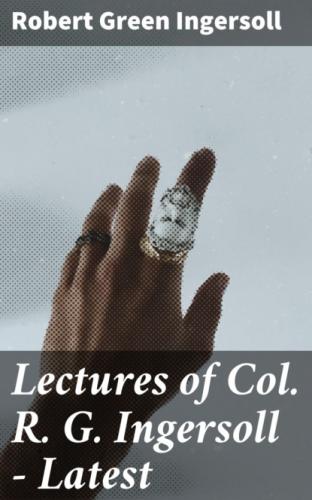Robert Green Ingersoll
Lectures of Col. R. G. Ingersoll - Latest
Published by Good Press, 2019
EAN 4064066229788
Table of Contents
Ingersoll's Lecture on Liberty of Man, Woman and Child
Ingersoll's Lecture on "Orthodoxy"
Ingersoll's Lecture on "Blasphemy"
Ingersoll's Lecture entitled "Some Reasons Why"
Ingersoll's Lecture on Intellectual Development
Ingersoll's Lecture on Human Rights
Ingersoll's Lecture on Talmagian Theology (Second Lecture)
Ingersoll's Lecture on Talmagian Theology (Third lecture)
Ingersoll's Lecture on Religious Intolerance
Ingersoll's Lecture on Hereafter
Ingersoll's Lecture on the Review of His Reviewers
Ingersoll's Lecture on "How the Gods Grow"
Ingersoll's lecture on The Religion of Our Day
Ingersoll's Lecture on Heretics and Heresies
Ingersoll's Lecture on The Bible
Ingersoll's Lecture on Voltaire
Ingersoll's Lecture on Myth and Miracles
Ingersoll's Letter, Is Suicide a Sin? (Colonel Ingersoll's First Letter)
Ingersoll's Letter, The Right to One's Life Colonel Ingersoll's Eloquent Reply to His Critics
Ingersoll's Lecture on Thomas Paine—Delivered in Central Music Hall,
Chicago, January 29, 1880 (From the Chicago Times, Verbatim Report)
Ladies and Gentlemen:—It so happened that the first speech—the very first public speech I ever made—took occasion to defend the memory of Thomas Paine.
I did it because I had read a little something of the history of my country. I did it because I felt indebted to him for the liberty I then enjoyed—and whatever religion may be true, ingratitude is the blackest of crimes. And whether there is any God or not, in every star that shines, gratitude is a virtue.
The man who will tell the truth about the dead is a good man, and for one, about this man, I intend to tell just as near the truth as I can.
Most history consists in giving the details of things that never happened—most biography is usually the lie coming from the mouth of flattery, or the slander coming from the lips of malice, and whoever attacks the religion of a country will, in his turn, be attacked. Whoever attacks a superstition will find that superstition defended by all the meanness of ingenuity. Whoever attacks a superstition will find that there is still one weapon left in the arsenal of Jehovah—slander.
I was reading, yesterday, a poem called the "Light of Asia," and I read in that how a Boodh seeing a tigress perishing of thirst, with her mouth upon the dry stone of a stream, with her two cubs sucking at her dry and empty dugs, this Boodh took pity upon this wild and famishing beast, and, throwing from himself the Yellowrobe of his order, and stepping naked before this tigress, said: "Here is meat for you and your cubs." In one moment the crooked daggers of her claws ran riot in his flesh, and in another he was devoured. Such, during nearly all the history of this world, has been the history of every man who has stood in front of superstition.
Thomas Paine, as has been so eloquently said by the gentleman who introduced me, was a friend of man, and whoever is a friend of man is also a friend of God—if there is one. But God has had many friends who were the enemies of their fellow-men. There is but one test by which to measure any man who has lived. Did he leave this world better than he found it? Did he leave in this world more liberty? Did he leave in this world more goodness, more humanity, than when he was born? That is the test. And whatever may have been the faults of Thomas Paine, no American who appreciates liberty, no American who believes in true democracy and pure republicanism, should ever breathe one word against his name. Every American, with the divine mantle of charity, should cover all his faults, and with a never-tiring tongue should recount his virtues.
He was a common man. He did not belong to the aristocracy. Upon the head of his father God had never poured the divine petroleum of authority. He had not the misfortune to belong to the upper classes. He had the fortune to be born among the poor and to feel against his great heart the throb of the toiling and suffering masses. Neither was it his misfortune to have been educated at Oxford. What little sense he had was not squeezed out at Westminster. He got his education from books. He got his education from contact with fellow-men, and he thought, and a man is worth just what nature impresses upon him. A man standing by the sea, or in a forest, or looking at a flower, or hearing a poem, or looking in the eyes of the woman he loves, receives all that he is capable of receiving—and if he is a great man the impression is great, and he uses it for the purpose of benefiting his fellow-man.
Thomas Paine was not rich, he was poor, and his father before him was poor, and he was raised a sailmaker, a very lowly profession, and yet that man became one of the mainstays of liberty in this world. At one time he was an excise man, like Burns. Burns was once—speak it softly—a gauger—and yet he wrote poems that will wet the cheek of humanity with tears as long as the world travels in its orb around the sun.
Poverty was his brother, necessity his master. He had more brains than books; more courage than politeness; more strength than polish. He had no veneration for old
